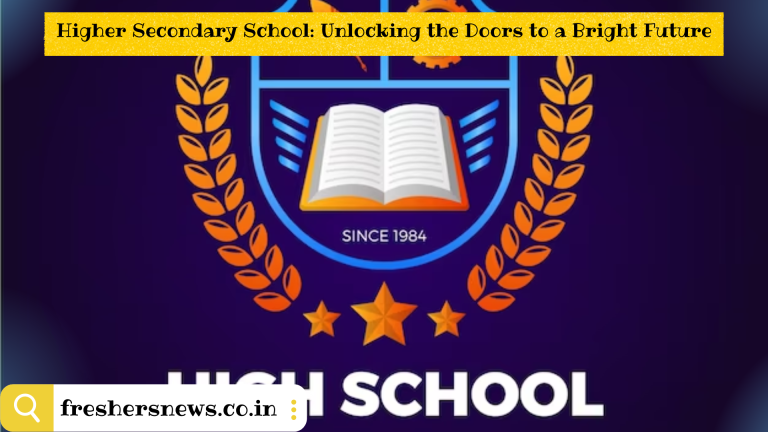Education is the key to success, and higher secondary school plays an integral part in molding students’ futures. Higher secondary education links the fundamental information gained in elementary and secondary school and the specialized knowledge necessary for further education or job pursuits.
In this article, we will look at the importance of high school and how it prepares students for their academic and professional careers. We’ll also learn some intriguing facts about higher secondary education.

Purpose
Higher Secondary School’s Purpose Higher secondary school, often known as senior secondary or high school, is an essential step in a student’s academic path. It usually spans the last two to three years of formal schooling before students go on to further education or employment. Higher secondary school’s major goal is to offer students with a well-rounded education that provides them with the essential skills, information, and mentality to thrive in their chosen route.
Did you know that the word “high school” was coined in Scotland in the 16th century to refer to elite academic institutions?
Courses and Interest
Academic Achievement Students can expand their grasp of numerous academic courses and pursue areas of interest in higher secondary school. The highly specialized curriculum allows students to select certain classes based on their job or further education ambitions. Students acquire a strong foundation and achieve experience in their chosen disciplines by focusing on these courses.
Furthermore, higher secondary school encourages critical thinking, problem-solving, and analytical abilities. Students are taught to think for themselves, to question assumptions, and to consider alternative viewpoints. This emphasis on critical thinking assists students in developing into well-rounded individuals capable of making informed judgements and adjusting to complicated problems in their future endeavours.
Interesting Fact: Students in Finland, a country known for its great education system, can attend either general or technical high schools. Vocational high schools offer specialised education and training for healthcare, technology, and hospitality occupations.
Development
Development on All Levels Education entails more than just academic knowledge; it also includes an individual’s overall development. This is recognised by higher secondary schools, which provide a platform for students to participate in extracurricular activities such as athletics, arts, clubs, and community service. These activities encourage collaboration, leadership, creativity, and personal development. Students learn a wide range of abilities beyond the academic world and find their particular talents and passions by engaging in such endeavors.
Interesting Fact: Some high schools provide distinctive extracurricular programmes, such as robotics clubs, debate teams, and entrepreneurship programmes, which allow students to explore creative sectors and build skills that are in great demand in today’s employment market.
Vocations
Career Preparation, One of the primary goals of higher secondary education, is to prepare students for their chosen vocations. It provides students with the required abilities, information, and experiences to join the professional world successfully. Vocational training programmes and career counseling sessions are frequently integrated into the curriculum, allowing students to investigate various career paths and make educated decisions about their future.
Furthermore, the school provides possibilities for internships, work-study programmes, and industrial collaborations. These experiences expose students to real-world situations, helping them to apply their academic knowledge in real-world contexts. Such hands-on experiences bridge the gap between classroom learning and professional expectations, promoting a smooth transition from school to job.
Interesting Fact: Germany is known for its dual education system, which combines classroom learning with practical training. In this system, students spend part of their high school education in apprenticeships or on-the-job training, gaining valuable skills and experiences in their chosen fields.
Personal and Social Development
Personal and Social Growth Higher secondary school is an essential stage in one’s personal and social development. During this stage, students progress academically, emotionally, and socially. They learn how to successfully manage their time, create objectives, and build self-discipline. Students also develop strong interpersonal skills such as effective communication, collaboration, and empathy, which are necessary for success in personal and professional interactions.
Furthermore, higher secondary school promotes inclusion and variety. Students from all origins, ethnicities, and opinions interact, promoting a climate of tolerance and acceptance. Exposure to various perspectives and experiences prepares kids for a globalized society while also encouraging respect for others.
Interesting fact: Some high schools organise cultural exchange programmes that allow pupils to visit schools in other countries, experience diverse cultures firsthand, and form bonds with other students.
Higher Education
Higher Education Preparation further secondary school acts as a stepping stone for pupils who want to continue further education. The programme is designed to fulfil the prerequisites for a variety of colleges, institutions, and professional courses. Students are advised in selecting the appropriate academic combination based on their preferred field of study. They are also prepared for standardised examinations, such as college entrance exams, which are frequently required for admittance to postsecondary institutions.
Furthermore, higher secondary school provides pupils with the necessary intellectual and study abilities to flourish in higher education. They learn how to conduct successful research, write academically, conduct critical analysis, and manage their time. These abilities are instrumental in academic environments where autonomous study and higher-level thinking are valued.
Interesting Fact: Higher secondary school grades are a crucial element in deciding university admissions in various nations. In India, for example, the Central Board of Secondary Education (CBSE) administers the All India Senior School Certificate Examination (AISSCE), sometimes known as the “12th board exams,” which are heavily weighted in college admissions.
Conclusion:
Secondary school is an essential stage in a student’s educational journey, providing a stepping stone to a bright and prosperous future. It educates students intellectually, socially, and emotionally, providing them with the skills and information they need to succeed in their chosen vocations or further their education. Higher secondary schools play an essential role in unlocking doors to unlimited possibilities and creating future leaders by providing a well-rounded education, encouraging personal growth, and cultivating skills.



